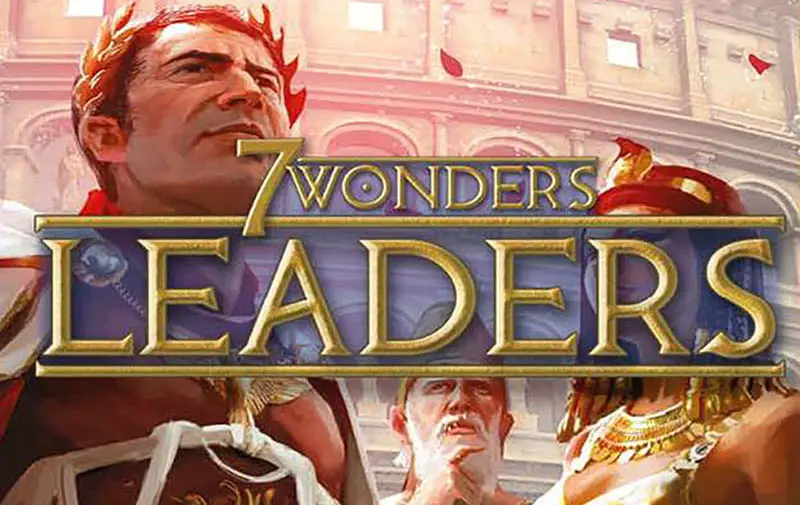
This expansion for 7 Wonders offers you the opportunity to put leaders at the head of your civilization. Represented by 36 new cards, these leaders will influence the growth of your city, each in their own way.
The game play is slightly changed, but the victory conditions remain the same as those in the basic 7 Wonders game.
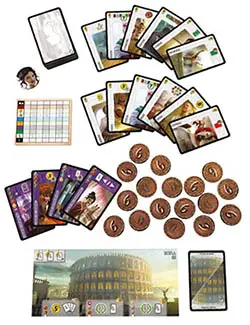
Components
- 1 Wonder board
- 1 Wonder card
- 36 Leader cards
- 4 Guild cards
- 17 value 6 coins
- 1 Courtesan token
- 1 rulebook
- 1 score booklet
- 1 blank Leader card
Game Elements
Wonder Board
Rome and its Colosseum constitute a new board, the effects of which are explained on the last page of this rulebook. This new board can only be used with the Leaders expansion.
Leader Cards
The Leaders (white cards) are a new card category. They are not added to the Age cards and have a different back to set them apart. Their cost, in the upper left corner of each card, is in coins only.
Blank Leader Card (semiramis)
A blank Leader card is present in your box. It will give you the chance to create a personality by yourself and add it to your games.
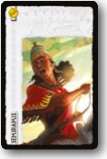
Guild Cards
4 new Guilds (purple cards) are to be added to those available in the basic game.
Take care though, as some of them can only be used with the Leaders expansion.
Coins
The 17 coins of value 6 should be added to the coins of the base game.
Courtesan Token
A special token which is used with one of the new Guilds, the Courtesan's Guild.
Score Booklet
A new score booklet is found in this box: it will allow you to add victory points earned by some Leaders.
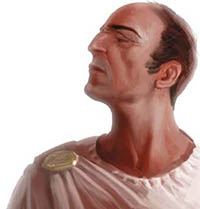
Setup
The new Guilds (purple cards) for Age III are added to those of the basic game. The rules for the Age III deck remain unchanged (meaning that the number of Guilds to be kept is still the same).
Each player starts with 6 coins (instead of 3 as in the base game).
Game Play
The game now starts with a Leader Phase.
In addition, a new game phase, the Recruitment Phase, takes place at the beginning of each Age.
Leader Phase
Each player is dealt a hand of 4 Leader cards, randomly distributed (to be kept hidden). The Leaders that are not dealt out are returned to the box.
Each player must secretly choose one card from their 4 and places it in front of himself or herself, face down. The 3 remaining cards are then handed to the player to their right.
Each player secretly chooses one card from the 3 received from the player to their left. The 2 remaining cards are then given to the player to their right.
Each player then secretly chooses one card from the 2 received from the player to their left. The remaining card is given to the player to their right.
Each player keeps the card from the player to their left and adds it to the 3 cards previously chosen.
At the end of this phase, each player has thus created a hand of 4 Leaders for him or herself. Age I can now start.
Overview of an Age
Each Age now starts with a Recruitment phase.
- Recruitment Phase
- Play the Age
- Conflict Resolution
I. Recruitment Phase
During this phase, each player will play one of their Leader cards. The cards are chosen secretly by each player, then revealed simultaneously to be played.
The Leader cards can be played in 3 ways:
- Recruit the Leader.
- Build a stage of a Wonder.
- Discard the card to gain 3 coins.
A. Recruit The Leader
The player pays the coin cost of the Leader (the coins are returned to the bank) and places the Leader card next to his or her Wonder board, face up.
To help your opponents read your board, we recommend that Hannibal and Caesar be placed in the same place as your red cards so that all your Shield symbols be displayed at the same place.
In the same way, place Euclid, Ptolemy and Pythagoras with the green cards. of the corresponding symbol.
B. Build A Stage Of A Wonder
To build a stage of a Wonder, the player uses the Leader card selected as a construction marker (face down). To do that, the cost indicated on the Wonder board must be paid, and not the one on the Leader card.
Note: this action will rarely be possible during the first Recruitment Phase, as the cities will generally not yet have the resources required for the construction of the first stage of their Wonder.
C. Discard The Card To Gain 3 Coins
The player can decide to discard the card to take 3 coins from the bank and add them to the treasury of his or her city. The Leader cards discarded in this fashion are returned to the box (face down).
The remaining Leader cards in each player's hand will be used later in the game: they are placed, face down, under the recruited Leader. Once this phase finished, the Age is played normally by the normal 7 Wonders rules.
Special case: during the Recruitment phase before Age III, each player is in possession of 2 Leader cards. The first is played in one of the 3 ways described above (a, b, or c) and the second is returned to the box, face-down.

End of the Game
As in the base game, the game ends at the end of Age III, after the distribution of Conflict Tokens. Each player totals the points of his or her civilization and the player with the highest total is declared the winner.
Expert Variant for 2 Players
The 2 player game uses the rules adjustment to the 7 Wonders game. The Recruitment phases follow the regular rules, only the Leaders phase is slightly modified:
Each player gets 4 Leader cards face down. No Leader is given to the Free City.
The players choose a first card in their hand of 4 cards and give the 3 remaining cards to their opponent. They choose a second card in this hand of 3 cards, then exchange their hand again, and so on.
At the end of this phase, each player thus has a hand of 4 Leaders to play the game.
The game is played according to the rules for 2 players in the base game with the Recruitment phases described in these rules.
Description Of Leaders
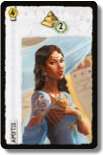
Amytis
At the end of the game, Amytis is worth 2 victory points (VP) for each Wonder stage built by the player.
She is the wife of Nebuchadnezzar, for whom the Hanging Gardens of Babylon are said to have been built.
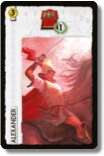
Alexander
At the end of the game, Alexander adds 1 VP to each victory token (the value of the victory tokens therefore goes from 1, 3 and 5 VP to 2, 4 and 6 VP).
He is the king of Macedonia, conqueror, founder of the ancient Greek empire. The only monarch in History to have forged an empire uniting both Orient and Occident.

Aristotle
At the end of the game, Aristotle adds 3 VP to each set of different scientific symbols (meaning that the bonus goes from 7 VP to 10 VP per set).
He is a Greek philosopher, long considered to be the ultimate embodiment of antique wisdom in the Occident due to his encyclopedic knowledge of arts and sciences.

Justinian
At the end of the game, Justinian is worth 3 victory points for each set of 3 Age cards (red, blue, green) in the player's city.
He is a Byzantine emperor. The most well known figure of late Antiquity, mainly for his restoration, albeit partially successful, of the Roman Empire.

Plato
At the end of the game, Plato is worth 7 victory points for each set of 7 Age cards (brown, gray, blue, yellow, green, red, purple) in the player's city.
He is a Greek philosopher, considered to be among the most important and omniscient. His work attest to the polyvalence of his knowledge: politics, justice, science, culture, arts...

Midas
At the end of the game, Midas is worth 1 victory point per every 3 coins in the player's treasury. Clarification: These points are added to those normally given for coins (the player therefore scores 2 VP for each set of 3 coins).
He is the King of Phrygia. Known mainly for his wealth and the myth stemming from it which said that everything he touched turned to gold.
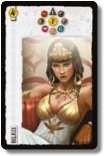
Bilkis
Once she enters play, Bilkis allows the player to purchase any resource by paying 1 coin to the bank once per turn.
She is the Queen of the Kingdom of Saba. Sublime, impressive by her wisdom and her intelligence, she's mainly known through the tales of King Solomon, which tell of her prosperity.

Maecenas
As soon as Maecenas enters play, his controlling player can recruit all of his or her future Lea- ders for free (during the Recruitment Phase), without having to pay their coin cost.
He is a Roman politician who used his influence and his fortune to promote arts and literature.
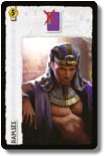
Ramses
As soon as Ramses enters play, the player can build all of his or her Guilds for free, without having to pay their resource costs.
He is the third Pharaoh of the Twenty-Ninth Dynasty. One of the monarchs who ruled the longest in Egypt and to whom is linked the greatest number of cultural remnants.

Tomyris
Once Tomyris enters play, during conflict resolution, the Defeat tokens of this player are given to the victorious neighboring city.
Note: Tomyris has no effect if the player's city is victorious during conflicts or for Conflicts which took place before she entered play.
She is the legendary queen of the Massagetae, who, according to myth, cut off the head of the King of Persia, Cyrus the Great, to avenge her son.
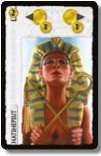
Hatshepsut
Once she enters play, each purchase of one or more resources from a neighbor grants 1 coin from the bank. note that this gain is limited to 1 coin per neighbor per turn.
Clarification: the player takes this gain from the bank immediately after having paid for his or her purchase.
She is a pharaoh-Queen of the Eighteenth Dynasty. Economic prosperity is attributed to her rule as the trade networks of Egypt were considerably strong.
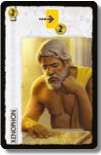
Xenophon
Xenophon grants 2 coins for each commercial structure (yellow card) that the player builds from this point forward. The coins are taken from the bank, at the moment when the structures are built.
Clarification: Xenophon has no effect on commercial structures built before he enters play.
He is a Greek philosopher, historian and soldier. Author of the first agronomy treatise known to History: the Oeconomicus.
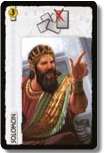
Solomon
Once Solomon enters play, the player can choose an Age card from the discard pile and put it in play for free.
He is the King of Israel whose wisdom and incorruptible sense of justice are legendary. He ordered Jerusalem's first temple built and gave his kingdom a highly structured administration.

Hannibal
As soon as he enter play, this Leader grant the amount of shields printed on their respective cards.
He is a Carthaginian general. One of the greatest military tacticians of History, famous for having seriously threatened Rome after crossing the Pyrenees with his elephants.

Caesar
As soon as he enter play, this Leader grant the amount of shields printed on their respective cards.
He is a Roman general, politician and writer. Rome's early days owe their thanks to him and his military acumen.

Nero
Nero grants 2 coins for each victory token earned by the player from this point forward. These coins are taken from the bank when the victory tokens are gained.
Clarification: Nero has no effect on victory tokens won before he enters play.
He is a Roman emperor. Known for his bellicose and easily riled personality, his rule brought military success to the Empire, as well as a monetary reform revaluing the denarius.
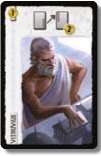
Vitruvius
Once he enters play, vitruvius grants 2 coins whenever the player builds a structure for free, through building chains. The coins are taken from the bank when the structures are built.
Clarification: Vitruvius has no effect on constructions built through construction chains before he enters play.
He is a Roman architect. His writings have strongly influenced the arts of the Renaissance and his treatise, De Architectura, remains a major work of classic Antiquity.

Croesus
When he enters play, Croesus immediately grants 6 coins, taken from the bank.
He is the last king of Lydia, famous for his immense fortune, which notably served to finance the construction of one of the wonders of the ancient world, the Temple of Artemis.
Hypatia, Nebuchadnezzar, Phidias, Varro
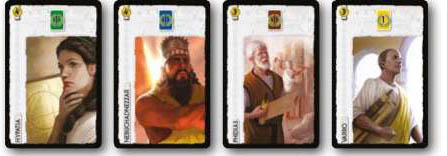
At the end of the game, these Leaders are worth 1 victory point (VP) per card of the corresponding color present in the player's city.
- Hypatia is a philosopher and mathematician, daughter of the last director of the Museum of Alexandria. Known as much for her grace and beauty as for her intelligence and her eloquence.
- Nebuchadnezzar is a king of Babylon, known for the many works and monuments he had erected throughout his kingdom and the cultural aspect due to them.
- Phidias is a sculptor of the first Greek classic style, main architect of the Athenian Parthenon.
- Varro is a Roman soldier, scientist and writer. His Rerum Rusticarum is a collection of texts describing one of the most complete pictures of agricultural management during the Antiquity.
Pericles, Praxiteles, Hiram



At the end of the game, these Leaders are worth 2 victory points per card of the corresponding color present in the player's city.
- Pericles is an exceptional Athenian orator and politician as well as brilliant strategist. He was very influential among his troops and feared by his foes during the Peloponnesian war.
- Praxiteles is a sculptor of the second Greek classic style. First artist to have represented female nude in Greek sculpture.
- Hiram is a smelting and blacksmith artisan, he helped King Solomon considerably when building his temple.
Sappho, Zenobia, Nefertiti, Cleopatra
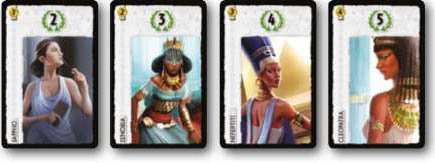
At the end of the game, these Leaders are worth the number of victory points printed on their card.
- Sappho is a Greek poet who lived in Lesbos. Known to have been fiercely feminist at an age where misogyny was the norm.
- Zenobia is a Queen of the Palmyrene Empire in the third century. She shaped her city into a prosperous cultural center, attracting many notable personalities of the time.
- Nefertiti is the royal wife of the Pharaoh Akhenaten, dearly beloved by her people, the artistic representations of her were more numerous than those of her husband.
- Cleopatra is the most well known of the Egyptian monarchs, her charm and subterfuge allowed her country to shine despite the Roman conquest.
Archimedes, Leonidas, Hammurabi, Imhotep
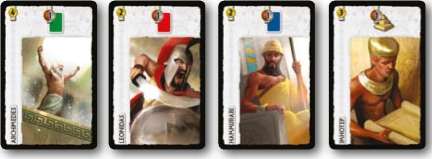
From the moment they enter play, these Leaders allow the player to build Structures of the corresponding color (Wonder stages for Imhotep) for one resource less than their written cost. Clarification: the resource removed from the cost is left to the player's choice. This can be a raw material (brown) or a manufactured good (gray).
- Archimedes is a Greek mathematician, scientist, physicist and engineer, the number Pi is associated to him as well as the calculation of bodies' volume mass by immersion in water.
- Leonidas is the Agiad king of Sparta who met a heroic death with 300 of his soldiers during the battle of Thermopylae while resisting the Persian invasion.
- Hammurabi is a King of Babylon at an age where the oldest known code of law known to History was written.
- Imhotep is the founder of Egyptian medicine, religious reformer and Egyptian builder. He is the architect of the most ancient angled pyramid in the world.
Euclid, Ptolemy, Pythagoras
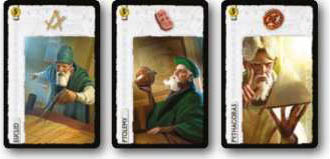
These Leaders grant the scientific symbol printed on their respective cards. This symbol is added to those of scientific structures (green cards) in the player's city.
- Euclid is a Greek mathematician, geometry specialist, and the author of an important text on modern mathematics: The Elements.
- Ptolemy is a Greek astronomer and astrologer, author of the Amalgest, an important text on astronomy which deeply influenced Occidental thought until the Renaissance.
- Pythagoras is the first self-proclaimed philosopher and Greek mathematician specialized in the laws of numbers, leading to the development of arithmetic, music, and geometry.
Description Of The Guilds
Gamer's Guild

1 victory point for each complete set of 3 coins present in the player's treasury.
Note: this gain is added to the one already granted by the coins.
Courtesan's Guild

When the Courtesan's Guild is built, the player must immediately place the "Courtesan" Token on one of the Leaders present in one neighboring city. The player then gains the benefits of that Leader and his or her associated effect.
Note: this Guild has no consequence for the player whose Leader is given the "Courtesan" Token.
Diplomat's Guild
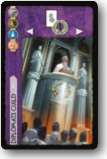
1 victory point for each Leader (white card) present in the neighboring cities.
Note: only the recruited leaders count, those used to build stages of a Wonder are not counted.
Architect's Guild
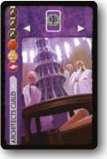
3 victory points for each purple card present in the neighboring cities.
Continue Reading


